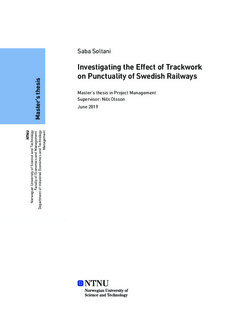| dc.description.abstract | Railways are one of the important modes of transportation and providing punctual and reliable services is the main quality factor of railway industries. In order to improve competitive advantages in the rapidly changing transportation market and to obtain a well-functioning transportation system, study of different variables influencing the punctuality of trains will need to be undertaken.
The main purpose of this study is to develop an understanding of the relation between trackwork and train punctuality.
To compile and upgrade the existing knowledge and experiences regarding the effect of trackwork on punctuality of railways both qualitative and quantitative approaches have been followed through reviewing the literature and analysing the punctuality and historical data. The study is also a pilot on combining railway traffic data and maintenance data for analytical purposes. This type of analysis can later show how different types of trackwork influence punctuality.
Previous studies on this subject have mainly utilised causes of delay data. In this study, we have found methods to complement such analyses also by taking into account the high-resolution data available from registered records of train movements. The current study illustrates how such time data can be utilised in order to enhance the decision support system for maintenance.
A data processing method is used to identify trains and line sections exposed to trackwork. A search engine is designed in order to correlate the two datasets (including train traffic data and trackwork data) and to extract the required data for the analysis. Through the overlap between the duration of trackwork and the delay in departure time, it is demonstrated that it is possible to combine railway infrastructure data with train traffic data.
As a result of this analysis, it is discovered that for railway traffic, in general, trackwork is related to 14.8% of all causes of delays. However, a relatively large share of the trackwork was related to train delays. Another important finding from this study is that, when trackwork are conducted, it is a high probability that there will be delays in train schedules and these delays are relatively large.
Apart from the result, it has been experienced that there is a need for more investigation with sufficiently updated data and some suggestions have been mentioned in the further research to evaluate the railway system more precisely. Nevertheless, this thesis provides the readers general view regarding the analysing different datasets and their strength and weaknesses which will aid in more efficient analysis. | |
